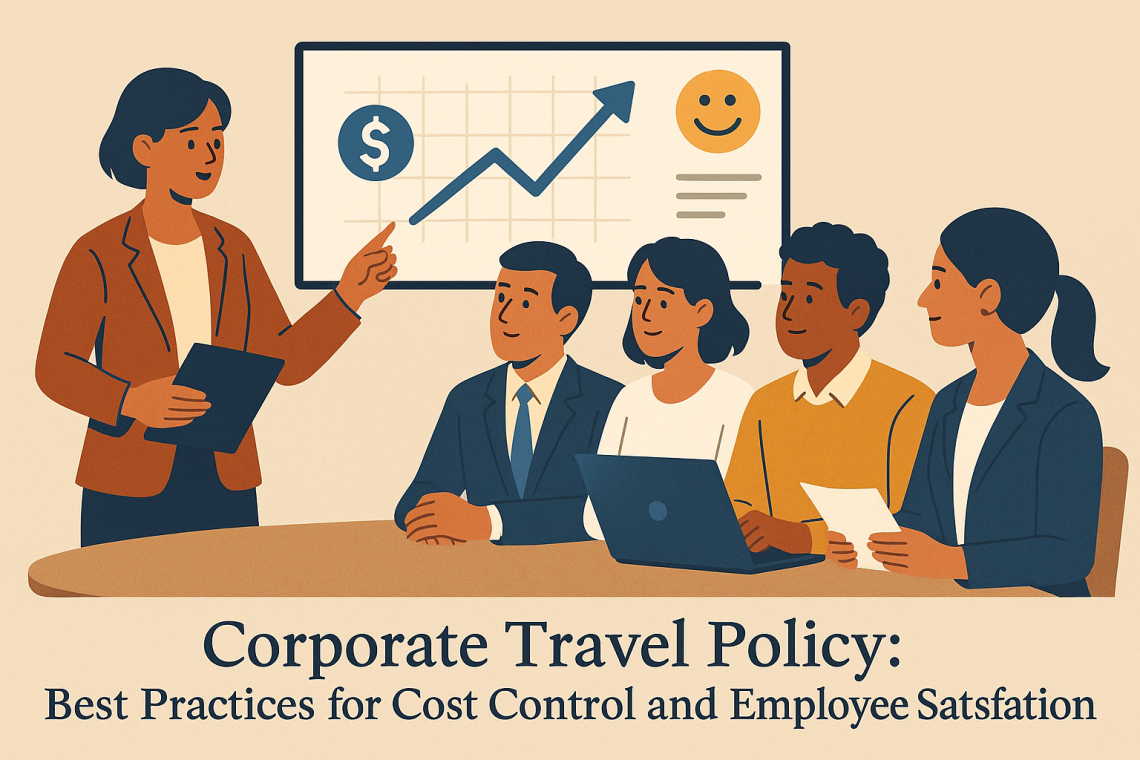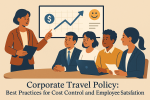Corporate Travel Policy: Best Practices for Cost Control and Employee Satisfaction
Tired of managing runaway travel costs while keeping employees happy? A well-crafted corporate travel policy offers the solution. Discover how to balance cost control and employee satisfaction by implementing clear booking procedures, leveraging advanced analytics, and promoting structured flexibility. This comprehensive guide reveals best practices for optimizing your travel program, from negotiating corporate rates and utilizing travel management software to incorporating employee feedback and ensuring traveler safety. Learn how to streamline your travel management, boost employee morale, and achieve significant cost savings. Read on to transform your corporate travel program today.
Important information
- A well-defined corporate travel policy balances cost control and employee satisfaction, covering bookings, expenses, reimbursements, and traveler safety.
- Key policy components include clear booking procedures, expense categories, spending limits, preferred vendors, and travel risk management.
- Companies can control costs by streamlining booking processes, negotiating corporate rates, using video conferencing, leveraging data analytics, and implementing expense management software.
- Employee satisfaction increases with flexible travel options, personalized choices, and “bleisure” travel opportunities, boosting morale and productivity.
- Regular policy reviews, using KPIs and incorporating employee feedback, ensure the policy remains relevant, effective, and beneficial for everyone.
Understanding the Corporate Travel Policy: Balancing Cost Control and Employee Satisfaction
A corporate travel policy is essential for guiding employee business trips, balancing cost savings with employee satisfaction. This policy outlines procedures for booking, expenses, and reimbursements, often specifying preferred vendors. Traveler safety is also a key component. By aligning with company goals and budgets, a clear policy ensures compliance and streamlines travel management, encouraging cost-conscious decisions. For instance, the policy sets expectations for spending limits, preferred vendors, and travel classes. This standardization allows companies to negotiate better rates and reduce overall travel costs. A well-crafted policy also addresses employee needs by incorporating flexible travel options and preferred accommodations, boosting satisfaction and compliance.
Benefits of a Corporate Travel Policy for Businesses
- Cost savings through negotiated rates with preferred vendors.
- Streamlined travel management with clear procedures.
- Improved budget control and expense tracking.
- Increased compliance with company spending guidelines.
Benefits of a Corporate Travel Policy for Employees
- Clear guidelines for booking and expense reimbursement.
- Enhanced travel safety through outlined procedures.
- Flexibility and choice in travel arrangements and accommodation.
- Improved travel experience leading to greater satisfaction.
What is a Corporate Travel Policy?
A corporate travel policy streamlines business trips by balancing cost savings with employee well-being and productivity. This policy simplifies travel management, ensuring compliance and addressing safety concerns. It outlines booking procedures, expense guidelines, reimbursements, and preferred vendors. A clear policy sets expectations and aligns travel with company goals and budget. A well-defined travel policy offers several advantages:
Cost Control
Negotiated rates with preferred vendors and clearly defined expense guidelines help manage and minimize travel costs.
Improved Employee Productivity
Streamlined processes and clear expectations reduce time spent on booking and expense reports, allowing employees to focus on their work.
Enhanced Compliance
A well-defined policy ensures adherence to company rules and regulations, minimizing risks.
Greater Transparency
Clear guidelines on expenses and reimbursements create transparency and accountability.
Risk Mitigation
Addressing safety concerns and providing guidance for travel emergencies helps protect employees while traveling.
Strategic Alignment
Aligning travel policies with company goals and budget ensures that business trips are cost-effective and contribute to overall objectives.
Benefits of a Well-Defined Travel Policy
A well-defined travel policy offers numerous advantages for your company. It streamlines travel plans and minimizes financial risks. A clear policy improves expense management and ensures compliance, reducing errors and misunderstandings. This leads to better cost control and increased efficiency. Furthermore, a strong travel policy enhances transparency and promotes accountability, building trust within the organization. It also improves traveler safety by providing risk management guidelines and resources. Finally, a comprehensive policy boosts employee satisfaction by simplifying travel procedures and setting clear expectations. This creates a beneficial situation for both the company and its employees.
Advantages of a Well-Defined Travel Policy
- Streamlined travel plans and minimized financial risks.
- Improved expense management and ensured compliance.
- Reduced errors, misunderstandings, and better cost control.
- Increased efficiency in travel procedures.
Further Benefits
- Enhanced transparency and promoted accountability.
- Improved traveler safety through risk management.
- Increased employee satisfaction.
- Clear expectations and simplified procedures.
Key Components of an Effective Travel Policy
A strong travel policy is crucial for smooth and cost-effective business trips. It should include clear booking procedures, defined expense categories, and spending limits to foster transparency and trust. Offering structured flexibility within the policy not only saves money but also boosts employee satisfaction. A well-defined policy should clearly outline permitted expenses, preferred vendors, and detailed booking steps. Providing helpful resources, such as links to travel platforms, expense forms, and emergency contacts, further enhances the policy’s effectiveness. Finally, incorporating travel risk management and regularly updating the policy based on employee feedback are vital for continuous improvement.
Advantages of a Strong Travel Policy
- Cost-effective business trips.
- Increased transparency and trust.
- Improved employee satisfaction.
Key Components of a Travel Policy
- Clear booking procedures.
- Defined expense categories and spending limits.
- List of permitted expenses and preferred vendors.
- Detailed booking steps.
- Helpful resources (travel platforms, expense forms, emergency contacts).
- Travel risk management.
- Regular updates based on feedback.
Best Practices for Cost Control in Corporate Travel
Streamlining your booking process is crucial for cost control. Consider using designated travel agencies or online booking tools. Pre-trip approvals ensure policy compliance and reduce unauthorized spending. Partnering with a corporate travel agency can unlock discounts and simplify bookings.
A well-structured yet flexible travel policy benefits both the company’s budget and employee satisfaction. Offering choices within defined parameters, such as different hotel categories or flight options, empowers employees to make cost-conscious decisions. Flexible travel dates can often lead to lower fares. Providing a choice between two approved hotels with varying prices offers flexibility while maintaining cost control.
Negotiate corporate rates with airlines and hotels for discounts. Leverage video conferencing for meetings to reduce the need for travel, significantly cutting travel frequency and associated costs. Booking flights and accommodations in advance can often secure lower fares.
Advanced analytics are essential for optimizing travel spend. Analyzing travel data reveals spending patterns and pinpoints areas for improvement, informing strategic decisions and refining travel policies. These data insights can also be leveraged to negotiate better deals, for instance, securing better rates with specific airlines by analyzing frequently booked routes.
Continuous monitoring and evaluation are vital for effective cost control. Real-time expense tracking offers immediate visibility into spending. Regularly review travel data to identify trends and potential savings. Analyze expense reports against the travel policy to ensure compliance.
Expense management software facilitates real-time tracking and flags policy violations. This allows for immediate intervention and corrective action, ensuring adherence to the travel policy and minimizing unnecessary expenses.
Implementing Clear Booking Procedures
Streamlined booking procedures ensure smooth travel and policy compliance. Employees must understand these rules, including whether to use a designated travel agency.
A clear policy should specify expense report deadlines and detailed travel budgets.
An appeals process for rejected expenses is essential.
The policy should address “bleisure” travel, which combines business and leisure trips.
Clear guidelines benefit everyone by improving compliance, simplifying travel, helping employees avoid unnecessary expenses, and preventing compliance problems.
How Structured Flexibility Ensures Cost Savings
Flexible travel policies empower employees by letting them choose their preferred travel options within set spending limits. This encourages savvy spending habits and boosts morale. For example, employees might opt for less expensive flights and accommodations, ultimately lowering travel costs while increasing job satisfaction.
Strategies for Reducing Business Travel Spend
Collaborating with preferred vendors like hotels and airlines can lead to better negotiated rates, effectively cutting travel costs.
For internal meetings, encourage the use of video conferencing tools to significantly reduce the need for travel.
Educate your employees about cost-saving measures, empowering them to make informed decisions.
A centralized booking system, through a travel management company or online platform, offers greater control and savings while streamlining the booking process.
Promoting early booking practices helps secure lower fares and accommodation rates.
Clear expense reporting guidelines, including per diem rates and a list of allowable expenses, ensure compliance and prevent overspending. Regularly review and update your travel policy to maintain its effectiveness and relevance in the ever-changing market.
Role of Advanced Analytics in Cost Optimization
Advanced analytics is crucial for optimizing business travel costs by uncovering spending patterns and travel habits. This data-driven approach enables the creation of travel policies that balance cost control and employee satisfaction. For example, identifying preferred airlines and hotels allows companies to negotiate better corporate rates. Predictive analytics anticipates future travel needs, enabling proactive budget adjustments. This streamlines travel programs, making them more efficient and cost-effective for both businesses and employees.
Utilizing Monitoring Tools and Ongoing Evaluations
Monitoring tools track key metrics, such as travel expenses, advance bookings, and adherence to policy.
Ongoing evaluations assess the policy’s effectiveness by examining cost control and employee satisfaction.
This data-driven approach allows for adjustments to ensure the policy remains relevant and impactful.
For instance, increased travel costs could trigger policy revisions.
However, employee satisfaction is a crucial factor.
Regular reviews also help keep the policy current.
Enhancing Employee Satisfaction through Travel Policy
Offering flexible travel options significantly improves employee morale. Valuing employee choice by letting them select preferred airlines, hotels, and travel times within budget enhances their overall travel experience. Bleisure travel, combining business with leisure, becomes an attractive perk.
- Choice of preferred airlines, hotels, and travel times.
- Bleisure travel options.
- Improved overall travel experience.
Empowering employees with travel autonomy reduces stress and boosts morale. Control over arrangements, including booking direct flights and selecting seats, creates a more personalized and positive experience. A 2023 study confirms that 75% of business travelers appreciate personalized travel options.
- Control over bookings, including direct flights and seat selection.
- More personalized and positive experience.
- Reduced stress and boosted morale.
Clear and accessible travel policies are essential. Regular communication and readily available training ensure employees understand and adhere to the guidelines. Providing prompt answers to travel-related questions further improves compliance. Survey data indicates that 80% of employees favor a clear travel policy.
- Regular communication of policies.
- Accessible training on guidelines.
- Prompt answers to travel questions.
The Importance of Flexibility in Travel Options
A flexible travel policy offers significant advantages for both employees and the organization. Empowering employees with personalized travel choices enhances employee satisfaction and improves the overall travel experience, leading to happier, more productive teams. A flexible approach allows employees to select preferred airlines or hotels, and even blend business trips with leisure time (“bleisure” travel). While offering flexibility, it’s crucial to maintain clear spending guidelines for responsible financial management. This balance ensures a mutually beneficial situation, boosting employee morale while maintaining financial accountability.
The Role of Traveler Autonomy and Personalization
Empowering travelers with greater control over their itineraries enhances their overall experience, they appreciate the freedom to select their preferred dining and lodging options. Such tailored travel arrangements also contribute to improved morale. For instance, employees often value the convenience of a direct flight or may require specific hotel room accommodations.
These personalized choices transform business trips into more agreeable journeys, fostering increased employee satisfaction and cultivating a more positive work atmosphere. Ultimately, personalization is essential for a successful travel program.
Ensuring Effective Communication of Travel Policy
Communicate your travel policy widely through various channels like email, your company intranet, and training sessions.
Introduce the travel policy to new hires during onboarding.
Ensure the policy document is easily accessible.
Use clear, concise language within the policy itself.
Hold Q&A sessions to address employee questions directly.
Gather regular feedback to ensure clarity and address any concerns.
Use visuals and examples to help explain complex sections.
Emphasize the policy’s advantages for both the company and its employees.
Provide regular updates and reminders.
Ensure the policy can be accessed on mobile devices.
Leveraging Technology for Effective Travel Management
Travel management software dramatically increases efficiency by automating time-consuming tasks, such as bookings and approvals. Automated policy enforcement ensures compliance and helps control costs by providing real-time visibility into travel spending. These platforms streamline processes, leading to a better traveler experience. Furthermore, they offer data-driven insights for more informed decision-making and integrate expense reporting for simplified reconciliation and analysis. The power of real-time data and analytics enables proactive adjustments to travel policies and budgets, allowing companies to react quickly to changing market conditions. Selecting the right software, however, is critical for maximizing these advantages. Here’s a breakdown of the key benefits:
Enhanced Efficiency
Automates time-consuming tasks like bookings and approvals, freeing up valuable time and resources.
Streamlines processes, reducing administrative overhead and improving overall workflow.
Cost Control
Provides real-time visibility into travel spending, enabling better budget management.
Automated policy enforcement ensures compliance and helps control costs.
Improved Traveler Experience
Simplifies the booking and travel process, leading to a more seamless and enjoyable experience for travelers.
Data-Driven Insights
Offers data-driven insights for more informed decision-making regarding travel policies and budgets.
Integrates expense reporting for simplified reconciliation and analysis.
Adaptability
Enables proactive adjustments to travel policies and budgets, allowing companies to react quickly to changing market conditions.
Choosing the right software is crucial for maximizing these benefits.
How Travel Management Software Optimizes Efficiency
Travel management software streamlines business trip booking and provides a transparent overview of related expenses. It ensures adherence to company travel policies while simplifying expense tracking and billing. This empowers HR with better cost control and offers employees a smoother booking process. Furthermore, the software helps keep travel costs down and trips policy-compliant by clarifying booking procedures and reimbursable expenses. Its integration with expense systems not only improves compliance but also facilitates analysis of the travel program’s ROI. Here’s a breakdown of the key benefits:
For HR and Management
- Improved cost control, enabling better budget management.
- Simplified expense tracking and billing, reducing administrative overhead.
- Enhanced compliance with company travel policies, minimizing risk.
- Data-driven insights into travel program ROI, facilitating informed decisions.
For Employees
- Streamlined booking process, saving time and effort.
- Clear guidelines on booking procedures and reimbursable expenses, reducing confusion.
- Easy expense reporting and reimbursement, eliminating hassle.
Automated Policy Enforcement and Real-time Insights
By integrating travel policies directly into booking tools, automated enforcement prevents out-of-policy reservations in real time. Flagged bookings require immediate manager approval, simplifying compliance for employees.
Real-time data analysis also provides valuable insights into travel spending, enabling proactive policy adjustments and improved cost control. Ultimately, this saves companies money and reduces administrative headaches.
Continuous Improvement and Policy Updates
A regularly updated corporate travel policy is key to its effectiveness and relevance. Using KPIs like travel spend, employee satisfaction, and policy compliance can pinpoint areas for improvement. For instance, tracking costs can uncover savings opportunities, while gauging employee satisfaction ensures the policy meets their needs. Gathering feedback through surveys or focus groups is crucial for enhancing policy relevance and boosting morale. But feedback alone isn’t sufficient; the policy must adapt based on the input received. This continuous improvement process allows the travel policy to evolve with the changing needs of both the company and its workforce, ultimately benefiting everyone involved. Here’s how to ensure your travel policy remains effective:
Track key performance indicators (KPIs). Monitor travel spend, employee satisfaction, and policy compliance to identify areas for improvement.
Gather feedback. Conduct surveys or organize focus groups to understand employee needs and preferences.
Adapt the policy. Revise the policy based on the gathered feedback and identified areas for improvement.
Communicate changes. Clearly communicate policy updates to all employees.
Regularly review. Continuously review and update the policy to ensure it remains relevant and effective.
How to Conduct Regular Policy Reviews and Updates
Regularly review your travel policy, perhaps quarterly or annually.
Analyze spending, booking patterns, and employee feedback to pinpoint areas for improvement.
Update the policy based on evolving business needs and market trends.
For instance, changing preferred hotels or adjusting for rising airfare costs could be beneficial.
Communicate updates clearly using training and resources to keep everyone informed.
A well-maintained policy saves money and boosts employee satisfaction.
Using Key Performance Indicators to Guide Improvements
Key Performance Indicators (KPIs) help track important cost savings, including average airfare and hotel rates.
Employee satisfaction is also a key metric, measured through surveys and feedback. This data refines travel policies for better cost control and traveler satisfaction.
Incorporating Employee Feedback for Policy Enhancement
Employee feedback is crucial for creating effective travel policies that meet their needs, resulting in smoother and more enjoyable business trips. Gather this valuable input through:
- surveys,
- focus groups,
- suggestion boxes.
This helps identify areas for improvement. This feedback loop not only keeps policies relevant but also boosts employee morale. Addressing concerns about:
- bookings,
- expenses,
- travel options,
shows a commitment to employee well-being and can even improve compliance, fostering a positive travel culture. This leads to happier employees who readily adhere to travel guidelines. For long-term success, consistent feedback is key to strengthening your travel program, benefiting both the company and its employees.


















